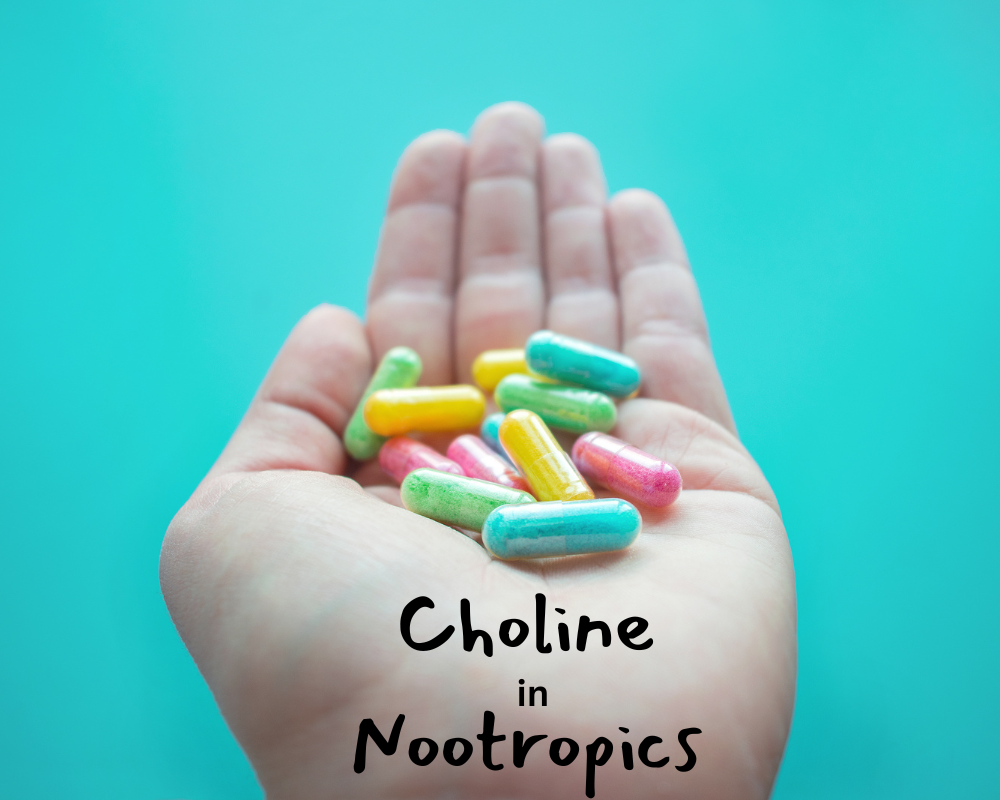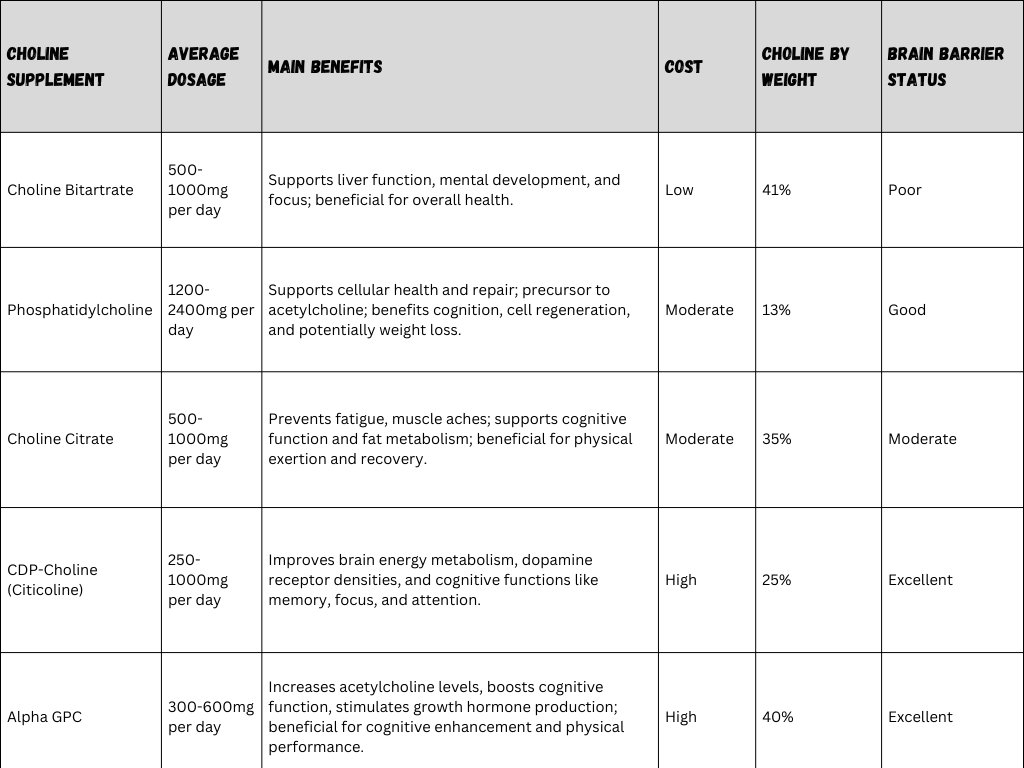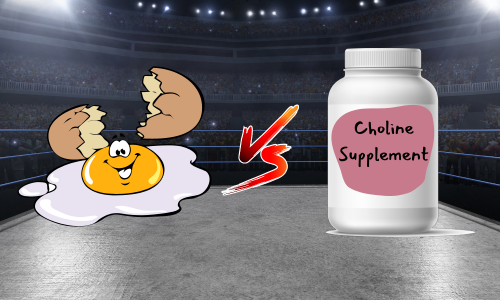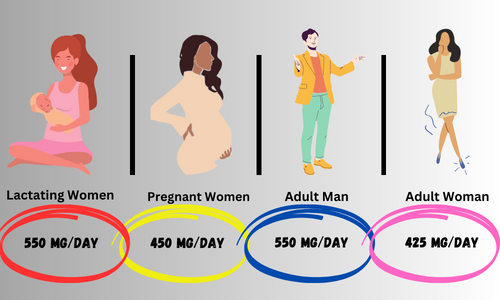
Introduction
In the quest for improved cognitive function and better brain health, the role of nutrition cannot be overlooked. One of the pivotal nutrients making waves in the realm of brain health is choline. This essential nutrient, often associated with nootropics, plays a vital role in brain function and overall cognitive enhancement. In this comprehensive guide, we delve into the world of dietary choline and its potent connection with nootropics.
What is Choline?
Embarking on our journey into the fascinating realm of brain health and cognitive optimization, we encounter choline. This indispensable, water-soluble nutrient serves as a vital cornerstone for a multitude of bodily functions. But what exactly is choline, and how does it contribute to maximizing your brain’s potential, especially when used in combination with other nootropics?
The Versatile Virtuoso: Choline in Action
Picture choline as the versatile virtuoso of your body’s biochemical orchestra. This multitasking maestro has its hands in everything from ensuring the structural integrity of cell membranes to directing the symphony of neurotransmission – the process that enables communication between nerve cells.
“90% of Americans have a Choline Deficiency”
However, the true magic unfolds when we consider choline’s remarkable influence on brain health. Here, choline isn’t merely a contributor; it’s a star performer, directly impacting memory formation, mood regulation, and a variety of other cognitive aspects. It’s like the conductor of your mind’s symphony, ensuring each section comes together to create a harmonious mental performance throughout.
Unlocking Brain Potential with Choline
The wonder of choline becomes even more captivating when we consider its potential to maximize brain performance. As a precursor to acetylcholine – a critical neurotransmitter involved in learning and memory – choline holds the keys to cognitive enhancement.
But the plot thickens. What if we told you that the true power of choline shines brightest when it’s stacked with other cognitive enhancers, commonly known as nootropics?
As the curtain lifts, we reveal the exciting interplay between choline and nootropics, a powerful alliance that can unlock the door to peak cognitive performance. By enhancing the production of acetylcholine, choline supplements provide the foundation for these nootropics to build upon, elevating their effects and optimizing brain function.
The Five Key Choline Dietary Supplements
Choline isn’t a one-size-fits-all kind of nutrient. This versatile compound presents itself in several unique forms, each with its individual attributes and specific impact on cognitive function. Whether you’re an athlete seeking to combat fatigue, a student striving for sharper focus, or an individual aiming to bolster overall brain health, there’s a choline supplement tailored just for you. Let’s delve into the distinct characteristics of five key choline variants and unravel their unique roles in cognitive enhancement.

Choline Bitartrate
Choline Bitartrate, a basic form of choline, plays an essential role in liver function and mental development. While not as potent as other forms of choline for cognitive enhancement, it’s an affordable option for those looking to support overall health. You can sometimes find this form of choline in sports supplements like pre workouts. Usually marketed as part of a “focus blend”
Phosphatidylcholine
Phosphatidylcholine, a key cell membrane component, serves dual purposes. It bolsters cellular health and repair, and is the precursor to acetylcholine, vital for brain function.
You’ll find it in various supplements, courtesy of its multi-dimensional roles. Nootropic stacks value it for cognitive enhancement, while anti-aging products utilize it for cell regeneration. It even finds its way into weight loss supplements for potential metabolism support, and liver health supplements for lipid transport.
Choline Citrate
Popular among athletes and fitness enthusiasts, Choline Citrate helps in preventing fatigue and muscle aches. It plays a role in fat metabolism and supports overall cognitive function. Choline Citrate is like the athletic cousin of Choline Bitartrate, tailor-made for physical exertion and recovery. While it maintains core choline benefits like supporting cognitive function, it steps up with extra offerings such as aiding fat metabolism, reducing workout fatigue, and smoothening muscle recovery.
Currently, it’s not widely featured in sports supplements due to its relative obscurity. However, with its distinctive advantages for athletes and fitness enthusiasts, this might soon change. For the time being, those who want to take advantage of Choline Citrate’s benefits can purchase it in its pure form and add it into their pre-workout or post-workout regimen.
CDP-Choline (Citicoline)*
Think of CDP-Choline (Citicoline) as a turbocharged brain booster. This nutrient supercharges your brain’s energy and strengthens its ability to respond to dopamine, a chemical messenger linked to motivation and happiness.
It’s like upgrading your car with a high-performance engine (choline) and adding a turbo booster (cytidine which converts into uridine). The choline powers your brain’s memory, focus, and attention, while the uridine dials up your brain’s response to dopamine.
In simple terms, CDP-Choline is like a high-octane fuel that not only amps up your brain’s horsepower but also makes the ride (your mood and cognitive functions) smoother and more enjoyable.
So, if you’re looking for a more stimulating brain-boosting supplement, CDP-Choline might be your equivalent of a turbo-charged sports car. But remember, always check with your healthcare provider before starting a new supplement.
Alpha GPC (Alpha-glycerophosphocholine)*
Alpha GPC is a bit like the high-powered fuel for your brain. It crosses the blood-brain barrier smoothly, pumping up the levels of acetylcholine, a crucial neurotransmitter for mental processes.
It shares similarities with CDP-Choline, another ‘brain fuel’. Both are great for boosting brain health and cognition. However, Alpha GPC is like the premium version – it packs more choline per unit, giving you more ‘bang for your buck’. This means it might be as good as, or possibly even better than, CDP-Choline when it comes to enhancing cognition.
For those with an athletic bend, Alpha GPC is like a two-in-one deal. Not only does it boost brain power, but it also kick-starts the production of growth hormone, helping muscles grow and recover faster.
So while Alpha GPC might be a quieter performer than CDP-Choline when it comes to stimulating dopamine response, it still shines with its higher choline content and dual benefits for the mind and body. It’s like choosing a hybrid car with impressive fuel economy and great performance over a gas guzzler that only offers speed.
Choline in Food vs Supplements: What’s the Difference?

The primary difference between consuming choline naturally through foods and taking it as a supplement involves the concentration, speed of absorption, and ease of getting an optimal dose.
When you consume foods high in choline, such as eggs, beef liver, or peanuts, your body receives the nutrient along with a host of others, which contribute to overall health. However, the concentration of choline in these foods is much lower than in supplements, and it might not be enough to see a significant cognitive enhancement, depending on your individual nutritional status and needs.
Furthermore, the amount of choline you absorb from food can vary depending on factors like the food’s composition and your body’s current nutritional state. On the other hand, choline supplements are formulated for optimal absorption and bioavailability, ensuring that your body can efficiently utilize the choline.
As for the supplements, the specific choline dietary supplements we talked about above each provide unique benefits and may be absorbed or utilized by your body differently. For example, Alpha GPC and CDP-Choline are more effective in increasing brain choline levels because they can cross the blood-brain barrier more easily.

So, is it necessary to take a choline supplement if you’re already eating enough foods high in choline? It depends on your goals and individual needs. If you’re seeking cognitive enhancement or if your diet does not provide adequate intake of sufficient choline, a supplement might be beneficial. However, it’s crucial to consult a healthcare provider to understand your unique nutritional needs and get personalized advice.
The Connection between Choline and Nootropics
Choline, an essential nutrient for the brain, serves as the primary building block for acetylcholine—a neurotransmitter intricately involved with memory formation, learning, and attention. When we supplement with choline, we provide the brain with the necessary resources to produce more acetylcholine, setting the stage for enhanced cognitive performance.
The Role of Nootropics
In the dynamic landscape of cognitive enhancement, we find a colorful array of nootropics, each contributing to the brain’s cognitive performance in unique ways. Racetams, despite their unregulated status and consequent difficulty to acquire, have a special relationship with acetylcholine. Renowned for their ability to stimulate the acetylcholine receptors in the brain, racetams amplify the actions of acetylcholine, thereby enhancing various cognitive functions.
However, this isn’t an exclusive relationship. Other nootropics, such as Huperzine A and Bacopa Monnieri, also demonstrate synergistic effects with choline.
Huperzine A, for instance, preserves acetylcholine levels in the brain by inhibiting an enzyme that would otherwise break it down. This conservation of acetylcholine means there’s more of this neurotransmitter available for the brain to utilize, enhancing memory and learning capabilities.
Similarly, Bacopa Monnieri, although it doesn’t directly interact with the cholinergic system, contributes to cognitive enhancement in a holistic way. It reduces anxiety and improves memory formation, thereby enhancing overall cognitive performance.
The list goes on and on with various nootropics.
Choline: The Symphony Conductor of Cognitive Enhancement
Like a skilled conductor directing a symphony, choline ensures harmony within this nootropic ensemble. By increasing the availability of choline – the precursor to acetylcholine – we can ensure that there’s an ample supply of this neurotransmitter for these nootropics to interact with. Whether it’s unlocking the potential of racetams, preserving acetylcholine with Huperzine A, or supporting the holistic benefits of Bacopa Monnieri, choline is the common factor that maximizes these benefits.
In essence, while nootropics each bring unique strengths to the cognitive enhancement table, it’s choline that ensures these strengths can be fully utilized. This interplay underscores the pivotal role of choline in any cognitive enhancement strategy, demonstrating its ability to amplify the effects of a variety of nootropics.
Understanding the Balance: Choline Dosage and Potential Side Effects
Choline is a key player in brain health, but like all nutrients, there’s an art to getting the dosage right. It’s like a tightrope act—you need enough to benefit, but too much can tip the balance and lead to potential side effects.
The chart above offers a guide to recommended dosages for different intakes of choline in supplements. Remember, more isn’t always better in the world of supplementation. Excessive choline intake can lead to undesirable symptoms such as headaches, nausea, and fatigue. It’s vital to stick to these guidelines and always consult a healthcare provider before starting a new supplementation routine.
When it comes to stacking nootropics, things can get a bit tricky. Let’s take Huperzine A and Alpha GPC, for example. On one hand, Alpha GPC is a potent source of choline, boosting the production of acetylcholine in the brain. On the other hand, Huperzine A works as a protective shield for acetylcholine, inhibiting acetylcholinesterase, an enzyme that breaks down acetylcholine.
You might think that combining these two would supercharge your cognitive functions. And while they can work well together, there’s a delicate balance to maintain. An excessive combination could lead to an overproduction of acetylcholine, which might result in side effects. So, even as you aim to boost your brain health, always remember – moderation is key.
Conclusion
The journey through the complex world of cognitive enhancement places choline as a critical cornerstone in our pursuit of better brain health. Its partnership with nootropics underlines the potential to unlock peak cognitive performance. However, as every individual’s cognitive and nutritional needs are unique, it’s essential to approach these supplements thoughtfully and seek professional advice before starting any new supplementation routine. As we continue to explore and understand the intricacies of brain health, the role of choline in cognitive enhancement is increasingly affirmed, propelling us towards maximizing our cognitive abilities and brain potential.
FAQ’s
Q: Can intravenous choline supplementation benefit patients with liver disease?
A: Patients with liver disease, or liver cancer particularly those with choline deficiency, may benefit from intravenous choline supplementation. This treatment can help reverse hepatic abnormalities and prevent further liver damage.
Q: Is choline therapy beneficial for cognitive impairments?
A: Choline therapy, including the use of choline supplements, is being studied as a potential treatment for cognitive impairments like Alzheimer’s disease, due to its role in memory and cognitive function.
Q: Does choline play a role in preventing Alzheimer’s disease?
A: Preliminary research suggests that higher choline intakes might be associated with a lower risk of Alzheimer’s disease, due to its role in brain development and function.
Q: What choline supplements should I look for in a good pre-workout drink?
A: When looking for a pre-workout drink, it’s beneficial to find one with a form of choline supplement. Choline Bitartrate and Alpha GPC (Alpha-glycerylphosphorylcholine) are commonly used in these drinks.
Q: What are the side effects of exceeding the tolerable upper intake level of choline?
A: Exceeding the upper intake level of choline, established by the Food and Nutrition Board, can lead to side effects like fishy body odor, increased blood pressure, and liver dysfunction.
Q: What are the benefits of dietary phosphatidylcholine?
A: Dietary phosphatidylcholine, a source of choline, supports healthy cell membranes, brain development, and cognitive function. It also potentially reduces the risk of neural tube defects in pregnant women.
